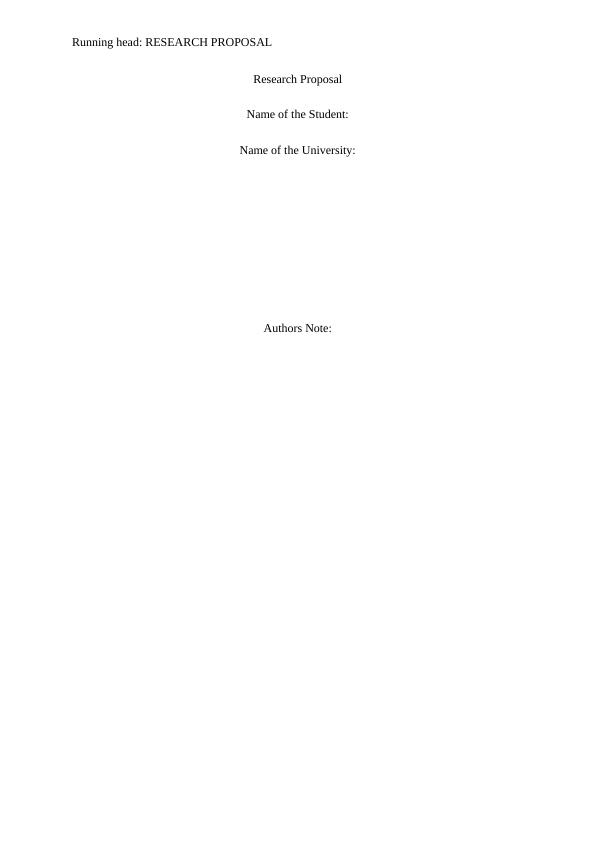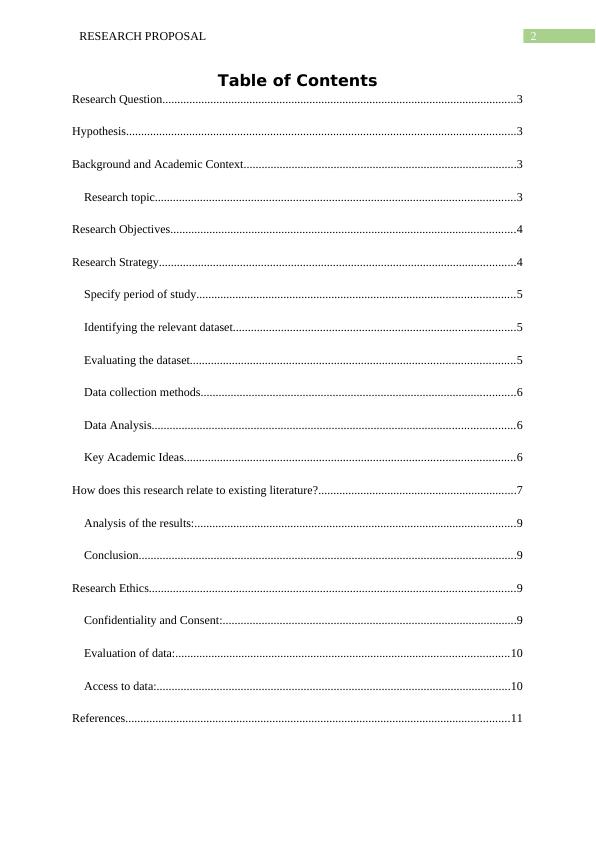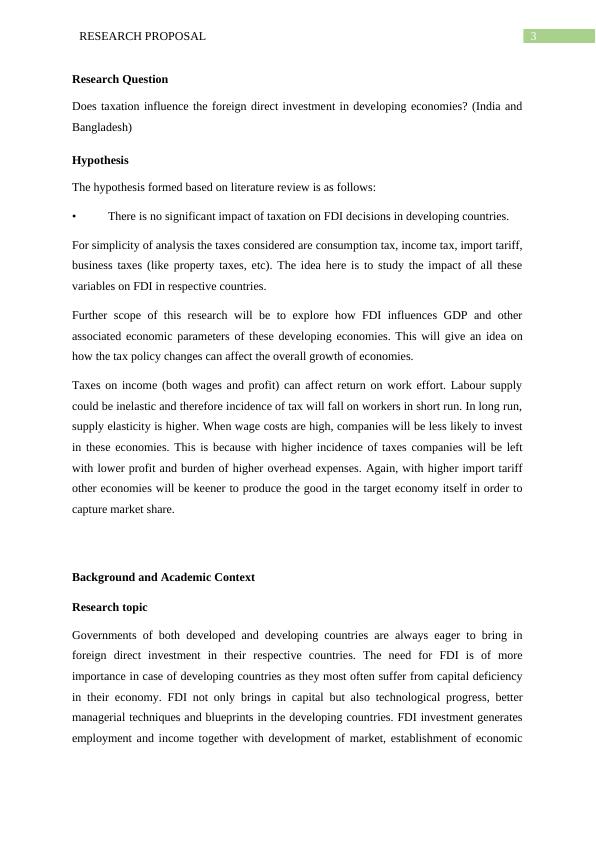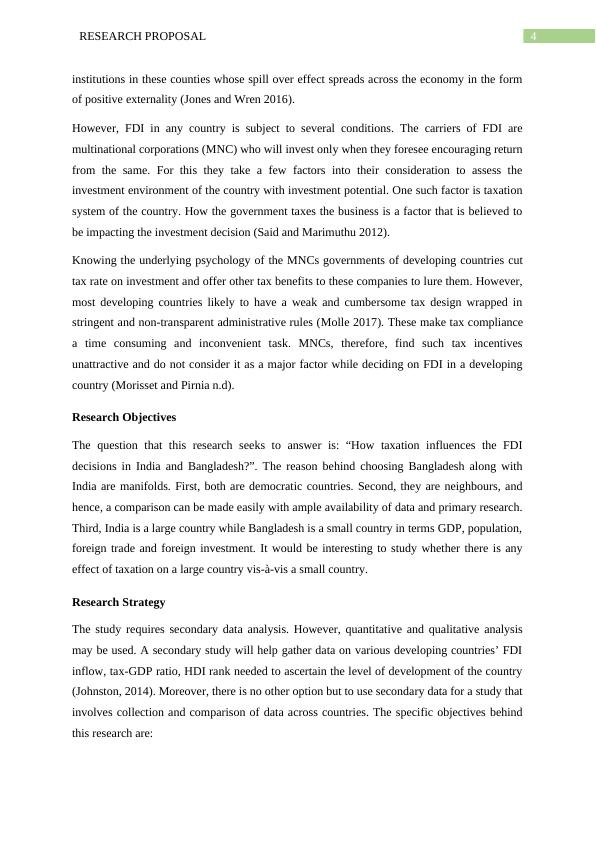Taxation and Foreign Direct Investment in Developing Economies: A Study of India and Bangladesh
Added on 2023-06-10
13 Pages4115 Words471 Views
Running head: RESEARCH PROPOSAL
Research Proposal
Name of the Student:
Name of the University:
Authors Note:
Research Proposal
Name of the Student:
Name of the University:
Authors Note:

2RESEARCH PROPOSAL
Table of Contents
Research Question......................................................................................................................3
Hypothesis..................................................................................................................................3
Background and Academic Context...........................................................................................3
Research topic........................................................................................................................3
Research Objectives...................................................................................................................4
Research Strategy.......................................................................................................................4
Specify period of study..........................................................................................................5
Identifying the relevant dataset..............................................................................................5
Evaluating the dataset............................................................................................................5
Data collection methods.........................................................................................................6
Data Analysis.........................................................................................................................6
Key Academic Ideas..............................................................................................................6
How does this research relate to existing literature?..................................................................7
Analysis of the results:...........................................................................................................9
Conclusion..............................................................................................................................9
Research Ethics..........................................................................................................................9
Confidentiality and Consent:..................................................................................................9
Evaluation of data:...............................................................................................................10
Access to data:......................................................................................................................10
References................................................................................................................................11
Table of Contents
Research Question......................................................................................................................3
Hypothesis..................................................................................................................................3
Background and Academic Context...........................................................................................3
Research topic........................................................................................................................3
Research Objectives...................................................................................................................4
Research Strategy.......................................................................................................................4
Specify period of study..........................................................................................................5
Identifying the relevant dataset..............................................................................................5
Evaluating the dataset............................................................................................................5
Data collection methods.........................................................................................................6
Data Analysis.........................................................................................................................6
Key Academic Ideas..............................................................................................................6
How does this research relate to existing literature?..................................................................7
Analysis of the results:...........................................................................................................9
Conclusion..............................................................................................................................9
Research Ethics..........................................................................................................................9
Confidentiality and Consent:..................................................................................................9
Evaluation of data:...............................................................................................................10
Access to data:......................................................................................................................10
References................................................................................................................................11

3RESEARCH PROPOSAL
Research Question
Does taxation influence the foreign direct investment in developing economies? (India and
Bangladesh)
Hypothesis
The hypothesis formed based on literature review is as follows:
• There is no significant impact of taxation on FDI decisions in developing countries.
For simplicity of analysis the taxes considered are consumption tax, income tax, import tariff,
business taxes (like property taxes, etc). The idea here is to study the impact of all these
variables on FDI in respective countries.
Further scope of this research will be to explore how FDI influences GDP and other
associated economic parameters of these developing economies. This will give an idea on
how the tax policy changes can affect the overall growth of economies.
Taxes on income (both wages and profit) can affect return on work effort. Labour supply
could be inelastic and therefore incidence of tax will fall on workers in short run. In long run,
supply elasticity is higher. When wage costs are high, companies will be less likely to invest
in these economies. This is because with higher incidence of taxes companies will be left
with lower profit and burden of higher overhead expenses. Again, with higher import tariff
other economies will be keener to produce the good in the target economy itself in order to
capture market share.
Background and Academic Context
Research topic
Governments of both developed and developing countries are always eager to bring in
foreign direct investment in their respective countries. The need for FDI is of more
importance in case of developing countries as they most often suffer from capital deficiency
in their economy. FDI not only brings in capital but also technological progress, better
managerial techniques and blueprints in the developing countries. FDI investment generates
employment and income together with development of market, establishment of economic
Research Question
Does taxation influence the foreign direct investment in developing economies? (India and
Bangladesh)
Hypothesis
The hypothesis formed based on literature review is as follows:
• There is no significant impact of taxation on FDI decisions in developing countries.
For simplicity of analysis the taxes considered are consumption tax, income tax, import tariff,
business taxes (like property taxes, etc). The idea here is to study the impact of all these
variables on FDI in respective countries.
Further scope of this research will be to explore how FDI influences GDP and other
associated economic parameters of these developing economies. This will give an idea on
how the tax policy changes can affect the overall growth of economies.
Taxes on income (both wages and profit) can affect return on work effort. Labour supply
could be inelastic and therefore incidence of tax will fall on workers in short run. In long run,
supply elasticity is higher. When wage costs are high, companies will be less likely to invest
in these economies. This is because with higher incidence of taxes companies will be left
with lower profit and burden of higher overhead expenses. Again, with higher import tariff
other economies will be keener to produce the good in the target economy itself in order to
capture market share.
Background and Academic Context
Research topic
Governments of both developed and developing countries are always eager to bring in
foreign direct investment in their respective countries. The need for FDI is of more
importance in case of developing countries as they most often suffer from capital deficiency
in their economy. FDI not only brings in capital but also technological progress, better
managerial techniques and blueprints in the developing countries. FDI investment generates
employment and income together with development of market, establishment of economic

4RESEARCH PROPOSAL
institutions in these counties whose spill over effect spreads across the economy in the form
of positive externality (Jones and Wren 2016).
However, FDI in any country is subject to several conditions. The carriers of FDI are
multinational corporations (MNC) who will invest only when they foresee encouraging return
from the same. For this they take a few factors into their consideration to assess the
investment environment of the country with investment potential. One such factor is taxation
system of the country. How the government taxes the business is a factor that is believed to
be impacting the investment decision (Said and Marimuthu 2012).
Knowing the underlying psychology of the MNCs governments of developing countries cut
tax rate on investment and offer other tax benefits to these companies to lure them. However,
most developing countries likely to have a weak and cumbersome tax design wrapped in
stringent and non-transparent administrative rules (Molle 2017). These make tax compliance
a time consuming and inconvenient task. MNCs, therefore, find such tax incentives
unattractive and do not consider it as a major factor while deciding on FDI in a developing
country (Morisset and Pirnia n.d).
Research Objectives
The question that this research seeks to answer is: “How taxation influences the FDI
decisions in India and Bangladesh?”. The reason behind choosing Bangladesh along with
India are manifolds. First, both are democratic countries. Second, they are neighbours, and
hence, a comparison can be made easily with ample availability of data and primary research.
Third, India is a large country while Bangladesh is a small country in terms GDP, population,
foreign trade and foreign investment. It would be interesting to study whether there is any
effect of taxation on a large country vis-à-vis a small country.
Research Strategy
The study requires secondary data analysis. However, quantitative and qualitative analysis
may be used. A secondary study will help gather data on various developing countries’ FDI
inflow, tax-GDP ratio, HDI rank needed to ascertain the level of development of the country
(Johnston, 2014). Moreover, there is no other option but to use secondary data for a study that
involves collection and comparison of data across countries. The specific objectives behind
this research are:
institutions in these counties whose spill over effect spreads across the economy in the form
of positive externality (Jones and Wren 2016).
However, FDI in any country is subject to several conditions. The carriers of FDI are
multinational corporations (MNC) who will invest only when they foresee encouraging return
from the same. For this they take a few factors into their consideration to assess the
investment environment of the country with investment potential. One such factor is taxation
system of the country. How the government taxes the business is a factor that is believed to
be impacting the investment decision (Said and Marimuthu 2012).
Knowing the underlying psychology of the MNCs governments of developing countries cut
tax rate on investment and offer other tax benefits to these companies to lure them. However,
most developing countries likely to have a weak and cumbersome tax design wrapped in
stringent and non-transparent administrative rules (Molle 2017). These make tax compliance
a time consuming and inconvenient task. MNCs, therefore, find such tax incentives
unattractive and do not consider it as a major factor while deciding on FDI in a developing
country (Morisset and Pirnia n.d).
Research Objectives
The question that this research seeks to answer is: “How taxation influences the FDI
decisions in India and Bangladesh?”. The reason behind choosing Bangladesh along with
India are manifolds. First, both are democratic countries. Second, they are neighbours, and
hence, a comparison can be made easily with ample availability of data and primary research.
Third, India is a large country while Bangladesh is a small country in terms GDP, population,
foreign trade and foreign investment. It would be interesting to study whether there is any
effect of taxation on a large country vis-à-vis a small country.
Research Strategy
The study requires secondary data analysis. However, quantitative and qualitative analysis
may be used. A secondary study will help gather data on various developing countries’ FDI
inflow, tax-GDP ratio, HDI rank needed to ascertain the level of development of the country
(Johnston, 2014). Moreover, there is no other option but to use secondary data for a study that
involves collection and comparison of data across countries. The specific objectives behind
this research are:

End of preview
Want to access all the pages? Upload your documents or become a member.
Related Documents
How taxation influences the foreign direct investment in developing economieslg...
|8
|2905
|459
Lowering Australian Corporate Tax Rate: Good Policy or Not?lg...
|3
|1058
|454
Foreign-Direct Investment and Economic Growth in Malaysialg...
|15
|4776
|174
Analysis of the Relationship Between Foreign Direct Investmentlg...
|15
|4592
|81
Factors Encouraging Foreign Direct Investment in Omanlg...
|3
|807
|372
Advantages and Challenges to FDI in US | Researchlg...
|14
|3803
|23
